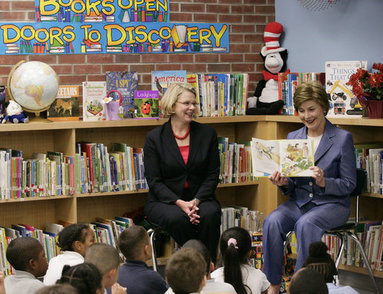
Mrs. Laura Bush, joined by U.S. Secretary of Education Margaret Spellings, reads to children at the Driggs School in Waterbury, Conn., Tuesday, July 24, 2007. Mrs. Bush also announced the 2007 Improving Literacy through School Libraries grants being awarded by the U.S. Department of Education. White House photo by Shealah Craighead
 Improving Literacy Through School Libraries
Improving Literacy Through School Libraries 
Mrs. Bush knows that reading is the key to achieving. The goal of the No Child Left Behind Act (NCLB) is full grade-level proficiency in reading by 2014. Achieving this goal calls for school libraries that are modern, technologically accessible, and filled with up-to-date books and reading materials.
NCLB's Improving Literacy Through School Libraries (LSL) grant program provides funds through NCLB to help schools improve their library media and address the reading challenges of their students. In July 2007, Mrs. Bush highlighted LSL when she traveled to Waterbury, Connecticut to announce the awarding of 78 competitive grants in 28 states, a total of more than $18 million.
LSL grants are specifically targeted to help underprivileged children. Only school districts and eligible public charter schools in which at least 20 percent of students are from families with incomes below the poverty line are eligible to apply. Grants may be awarded to districts in all 50 states and the District of Columbia, and set-aside grants are available for the American Territories and schools served by the Bureau of Indian Affairs
The LSL grants may be used to:
- Increase library holdings;
- Improve schools' technological resources and capabilities;
- Facilitate Internet links and other resource-sharing networks;
- Enhance the professional development of school library media specialists; and
- Expand hours of student access to library services.
Studies show that the grants are working. According to a report that surveyed 400 schools that received grant funding in 2003-04, grant recipients:
- Doubled their school library funding on average;
- Invested more than two-thirds of the funds on new print resources and materials;
- Invested in new computer hardware and additional staff;
- Acquired approximately 500 more books on average than non-grant recipients; and
- Increased operational hours and student access to libraries.
LSL grants have also enabled schools to improve cooperation and coordination between library professionals, teachers and principals on curriculum issues, according to Teacher Librarian magazine (April 2006). This will enable more educators to address their students' diverse literacy and reading challenges.
For more information on the Literacy Through School Libraries Grants program, please visit Improving Literacy Through School Libraries or contact:
U.S. Department of Education, OESE
Academic Improvement and Teacher Quality Programs
400 Maryland Avenue, SW
Washington, DC 20202
(800) USA-LEARN





